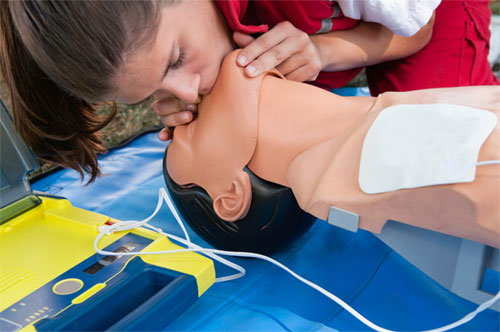First aid skills are invaluable in emergency situations, enabling individuals to provide immediate assistance and potentially save lives. However, as time passes, knowledge and techniques can fade. A first aid refresher course online serves as a vital tool to reinforce and update essential skills, ensuring that individuals maintain their ability to respond effectively in critical situations. In this article, we explore the key contents involved in first aid if you’re asking yourself where a first aid refresher course near me is, emphasizing the importance of ongoing training to enhance confidence and competence in providing immediate medical care.
Review of Basic First Aid Principles
A first aid refresher course typically begins with a comprehensive review of fundamental first aid principles. Participants revisit the primary assessment steps, focusing on the ABCs (Airway, Breathing, Circulation), and the importance of maintaining a safe environment for both the rescuer and the injured. The course covers the recognition of life-threatening conditions, such as cardiac arrest, choking, severe bleeding, and shock, refreshing participants’ knowledge of the critical initial response.
CPR and Automated External Defibrillator (AED) Updates
Cardiopulmonary resuscitation (CPR) and the use of automated external defibrillators (AEDs) are core components of any first aid refresher course. Participants receive updated guidelines and techniques for performing high-quality CPR, including chest compressions and rescue breaths. They learn about the latest recommendations for AED usage, including proper pad placement and device operation. Practical exercises allow participants to practice these skills on mannequins, ensuring their ability to respond effectively in cardiac emergencies.
First Aid for Common Injuries
The refresher course covers first aid for common injuries and illnesses that individuals may encounter in their daily lives. Topics can include wound management, fractures, sprains, burns, allergic reactions, seizures, and heat-related illnesses. Participants review proper techniques for dressing wounds, applying splints, and providing initial care to stabilize and alleviate symptoms. Emphasis is placed on up-to-date protocols and the use of appropriate materials and equipment available in first aid kits.
Medical Emergencies and Treatment Updates
Medical emergencies, such as heart attacks, strokes, asthma attacks, and diabetic emergencies, require immediate intervention. The refresher course provides updates on recognizing the signs and symptoms of these conditions and the latest recommended treatments. Participants learn about administering aspirin in suspected heart attack cases, assisting with the administration of emergency medication (e.g., EpiPen) for severe allergic reactions, and managing respiratory distress until professional medical help arrives.
Injury Prevention and Safety Measures
Prevention is a crucial aspect of first aid, and a refresher course includes a segment on injury prevention and safety measures. Participants learn about identifying and minimizing common hazards in their surroundings, both at home and in public spaces. The course covers topics such as fall prevention, proper lifting techniques, fire safety, and the importance of wearing personal protective equipment (PPE). Promoting a proactive safety mindset ensures that participants are equipped to prevent accidents and reduce the need for first aid intervention.

Scenario-based Training and Simulations
To reinforce skills and enhance decision-making abilities, scenario-based training and simulations are integrated into the refresher course. Participants engage in realistic simulations that mirror potential emergency situations. These scenarios challenge participants to assess the situation, prioritize care, and execute appropriate first aid interventions. Practical hands-on exercises provide an opportunity to practice skills, ensuring participants can apply their knowledge effectively in real-life situations.
Legal and Ethical Considerations
The refresher course covers legal and ethical considerations associated with providing first aid. Participants gain an understanding of their rights and responsibilities as first aid providers, including consent, confidentiality, and Good Samaritan laws. This knowledge





:max_bytes(150000):strip_icc()/GettyImages-1146122729-9d81c489eaaf477598230983a5d1f560.jpg)